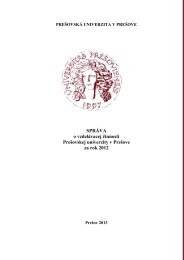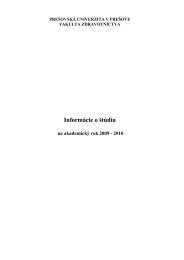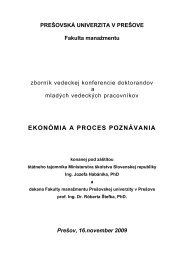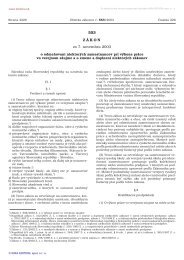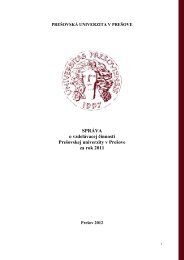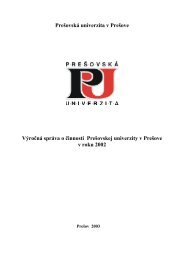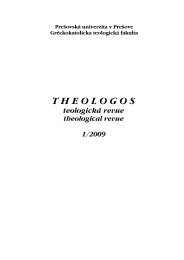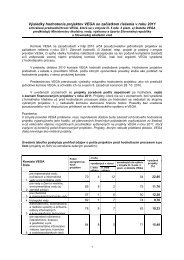T H E O L O G O S - Prešovská univerzita v Prešove
T H E O L O G O S - Prešovská univerzita v Prešove
T H E O L O G O S - Prešovská univerzita v Prešove
Create successful ePaper yourself
Turn your PDF publications into a flip-book with our unique Google optimized e-Paper software.
Bożena Drzewicka<br />
aggregate as well as in a reasonable recapitulation. The sources<br />
of basic rights named in this Charter are: the Universal Declaration<br />
of Human Rights (of the United Nations), the European Convention<br />
on the Protection of Human Rights and Basic Freedoms, the Social<br />
Charters, approved of by the Community and the Council of Europe,<br />
as well as the verdicts of the Court of Justice of the European Communities<br />
and the European Court of Human Rights.<br />
The Asian values are analysed with reference to Confucianism and<br />
Neo-Confucianism, philosophical Taoism (the “t’ao school”), Buddhism<br />
but also to Islam 1 . In the past, there was hardly any mention of human rights<br />
or of related ideas or values in Asia. Unlike Europe, that continent has no<br />
tradition of protecting the human rights. Due to a persistent functioning<br />
in a semi-feudal social order, nearly the entire Asian region had no good<br />
basis for the development of a consciousness of human rights. Unambiguously,<br />
the social order ensured the priority of a society with a clear<br />
hierarchy rather than of the individual. Therefore, hardly any reflections<br />
on the individual, or on humanism in the wider sense, can be referred to.<br />
The values which are associated with human rights and their protection by<br />
specialized institutions could not be promoted in Asia until the period that<br />
followed World War II. Such values were included in new constitutions of<br />
certain Asian nations, in fact, imposed by the victorious great powers, especially<br />
by the United States. A convincing example is Japan, where all possible<br />
democratic institutions formally exist. Neither in China nor elsewhere<br />
in Asia could we trace, in the history of political or philosophical concepts,<br />
any mention of human dignity as a justification of individual rights 2 .<br />
This epoch, characterized by globalization, seems to be one in which<br />
the confronting of values, including the human rights, across civilizations<br />
has a growing importance. Such confrontations are important both in<br />
international politics and in international standardizing 3 . Their significance<br />
can also be observed in present-day norms of the international law,<br />
within the hard and soft law. Thus the contemporary international law<br />
and its doctrine are especially interested in the issue in question 4 . The<br />
international protection of human rights and the related humane interna-<br />
1<br />
M.K. Nawaz, The Concept of Human Rights in Islamic Law, “Howard Law Journal”<br />
1965, No 11, p. 320-33; M.T. Franck, Human Rights in Third World Perspective, Dobbs<br />
Ferry, Oceana, 1982, p. 34-53.<br />
2<br />
A.H. Robertson, J.G. Merrills, Human Rights in the World: An Introduction to the Study<br />
of International Protection of Human Rights, Manchester, 1992, p. 40-64.<br />
3<br />
R. Kuźniar, Human rights and international relations, “The Polish Quarterly of International<br />
Affairs”, Summer 1998, p. 25-58.<br />
4<br />
For a detailed discussion see: C.C. Goud, Globalizing Democracy and Human Rights,<br />
Cambridge University Press 2004.<br />
22



